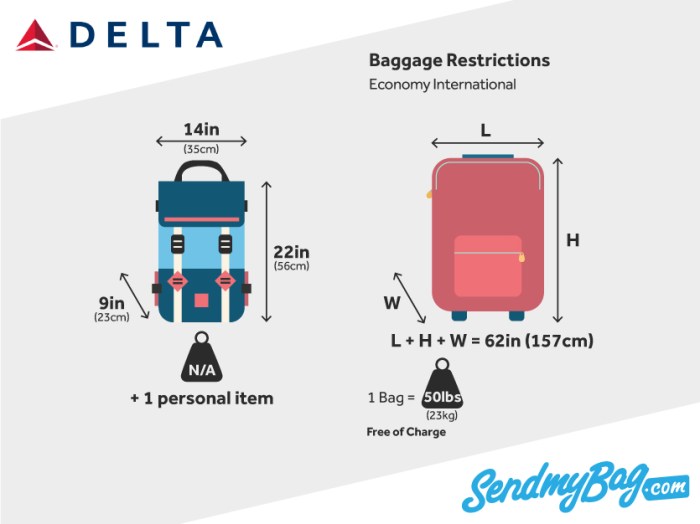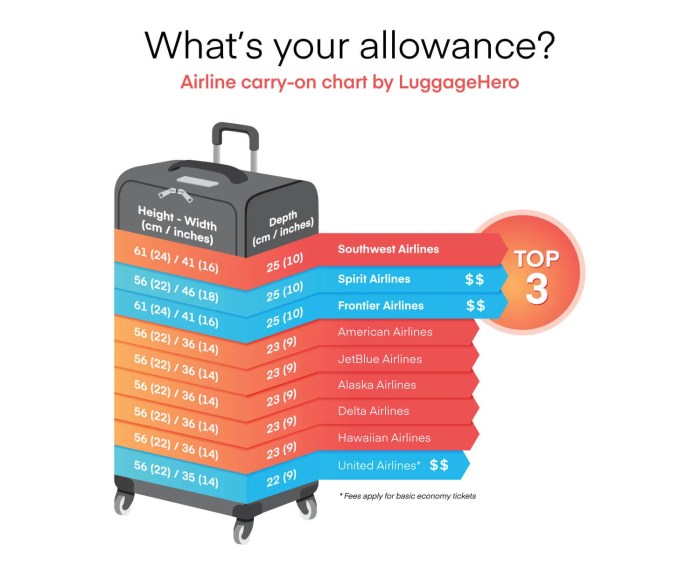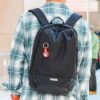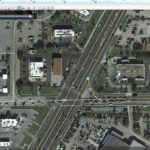Smart luggage regulations American Airlines Delta are becoming increasingly important for travelers. Understanding the specific size, weight, and permitted items for checked and carry-on baggage is crucial, especially if you’re using a smart suitcase. This guide compares American Airlines and Delta’s policies, offering insights into special allowances for frequent flyers, handling procedures for smart luggage, and potential fees. From battery restrictions to security protocols, we’ll cover all the essential details to help you navigate the complexities of air travel with your smart luggage.
This comprehensive guide delves into the specifics of smart luggage regulations on American Airlines and Delta. We’ll analyze the differences in baggage policies, focusing on how these airlines handle smart luggage, its potential advantages and disadvantages, and the security implications. Additionally, we’ll examine the baggage handling and processing procedures for checked and retrieved luggage, outlining the process for reporting issues and handling lost or delayed items.
Finally, we’ll discuss fees and charges, offering valuable tips and advice for a smooth travel experience.
Luggage Size and Weight Restrictions

Traveling with luggage can be a hassle, especially when navigating airline regulations. Understanding the specific size and weight restrictions for checked and carry-on baggage is crucial for a smooth and stress-free trip. This section delves into the policies of American Airlines and Delta, highlighting key differences and important considerations for frequent flyers.Airline baggage policies often vary, and these differences can impact the traveler’s experience.
Knowing these nuances is vital to avoid potential issues like baggage fees or delays. By understanding the details of each airline’s policy, travelers can prepare effectively and avoid unexpected costs.
Checked Baggage Size and Weight Limits
Airline checked baggage allowances vary significantly based on factors like booking class, fare type, and destination. Understanding these limitations helps travelers pack strategically and avoid excess baggage fees. Below is a comparison of size and weight limits for checked baggage on American Airlines and Delta.
| Airline | Dimensions (inches) | Weight (pounds) |
|---|---|---|
| American Airlines | 62 linear inches (length + width + height) | 50 pounds (domestic) / 70 pounds (international) |
| Delta | 62 linear inches (length + width + height) | 50 pounds (domestic) / 70 pounds (international) |
Carry-on Baggage Restrictions
Carry-on baggage policies are equally important to understand, as they affect what you can bring on the plane. Carry-on limitations vary significantly between airlines and even within a specific airline, based on the type of ticket. The following table Artikels the differences between American Airlines and Delta.
| Airline | Dimensions (inches) | Weight (pounds) |
|---|---|---|
| American Airlines | 22 x 14 x 9 | 40 pounds |
| Delta | 22 x 14 x 9 | 40 pounds |
Permitted Items for Carry-on Luggage
The following table details the permitted items for carry-on luggage on both airlines. Understanding these rules ensures that you are compliant and avoid delays.
| Item | American Airlines | Delta |
|---|---|---|
| Laptop bags | Allowed | Allowed |
| Small purses/handbags | Allowed | Allowed |
| Diapers/Baby supplies | Allowed (within reason) | Allowed (within reason) |
Prohibited Items for Checked Baggage
This section Artikels the items that are strictly prohibited in checked baggage on both airlines. These items are dangerous and pose a risk to safety, and airlines have strict policies against them.
- Flammable liquids and gases
- Explosives
- Weapons (unless declared and properly packaged)
- Dangerous goods (corrosive, radioactive, etc.)
- Certain types of batteries
These are just some examples; airlines have extensive lists of prohibited items. Always check the specific guidelines on the airline’s website for a comprehensive list.
Special Baggage Allowances for Frequent Flyers
Frequent flyers often enjoy special baggage allowances, such as increased checked baggage weight limits or free checked baggage allowances. These benefits are usually part of the airline’s loyalty programs. American Airlines and Delta both offer these types of perks. The specifics of these allowances vary depending on the level of membership in each program.
Special Considerations for Smart Luggage
Smart luggage, with its promise of convenience and connectivity, is rapidly gaining popularity. However, travelers need to understand how airlines like American Airlines and Delta handle these innovative suitcases, as well as potential pitfalls and advantages. This section delves into the specific considerations related to smart luggage for seamless travel experiences.Smart luggage, while promising a more convenient travel experience, introduces new considerations for both passengers and airlines.
Understanding these considerations, including security protocols, battery restrictions, and potential malfunctions, is crucial for a smooth and worry-free journey.
Airline Policies on Smart Luggage
American Airlines and Delta have differing approaches to smart luggage. American Airlines, for example, might have more stringent guidelines on battery size or charging procedures, potentially requiring the traveler to follow specific instructions to ensure the safety of the aircraft. Delta, on the other hand, may have more permissive rules, though still requiring compliance with security regulations. This variability in policies necessitates careful research by travelers.
Potential Issues with Smart Luggage
Several potential issues can arise with smart luggage. Battery restrictions are a key concern. Oversized or improperly labelled batteries could lead to delays or refusal of the luggage. Technical malfunctions, like software glitches or connectivity problems, can also cause issues. Data security concerns related to the storage and transmission of personal data through the luggage’s network are another aspect that needs careful attention.
Potential Advantages and Disadvantages of Smart Luggage
- Advantages: Smart luggage offers the potential for enhanced convenience, allowing for automatic weighing and tracking of baggage. Real-time updates about baggage status, reduced waiting times at baggage claim, and easy access to essential items during travel are also potential advantages. Furthermore, advanced features like integrated scales and GPS tracking can enhance security and provide added peace of mind for travelers.
- Disadvantages: Potential malfunctions, battery restrictions, and data security concerns are significant disadvantages. The need for consistent power supply, and compatibility issues with different airline systems and airport infrastructure, may also be potential drawbacks.
Security Implications of Smart Luggage
The security implications of smart luggage are multifaceted. Airlines must adapt their security protocols to accommodate these new devices. Potential vulnerabilities, such as unauthorized access to data stored on the luggage or interference with aircraft systems, need to be considered and mitigated. Airlines employ rigorous security checks to address these concerns.
Impact on Baggage Handling and Processing
Smart luggage could potentially streamline baggage handling and processing at airports. Automated systems, such as those for scanning and tracking, could reduce wait times. However, the integration of these new technologies with existing airport infrastructure might pose challenges. Airlines and airports will need to invest in compatible systems to ensure efficient and secure handling.
Examples of Airline Responses
Airlines are beginning to adapt their policies and procedures to accommodate smart luggage. For instance, American Airlines might implement specific guidelines for battery usage and charging, while Delta might offer more streamlined procedures for handling smart luggage.
Checking and Retrieving Luggage
Navigating the world of smart luggage requires a clear understanding of airline procedures, especially when it comes to checking and retrieving your baggage. This section details the processes for American Airlines and Delta, offering guidance on handling lost or delayed luggage, and reporting issues efficiently.The procedures for handling smart luggage, while similar to traditional luggage, might present some unique considerations due to the technology integrated into the devices.
Navigating American Airlines and Delta’s smart luggage regulations can be tricky, especially with all the different size and weight restrictions. It’s easy to get bogged down in the details, but don’t let it stress you out! If you’re having trouble forgetting a Wi-Fi network on your Android phone, this helpful guide can get you back on track in no time.
Luckily, once you understand the basics, the process of dealing with checked baggage becomes a breeze.
Understanding these specifics ensures a smoother travel experience.
Checking Smart Luggage
The process of checking smart luggage with American Airlines and Delta is generally the same as for standard checked baggage. Passengers should ensure the smart luggage meets the airline’s size and weight restrictions. Airlines often have specific instructions for handling electronic devices and battery-powered items. Carefully review the airline’s baggage policy for any additional stipulations.
Retrieving Smart Luggage
Retrieving your smart luggage from the baggage claim area is straightforward. Passengers should locate their baggage tag number and carefully examine the baggage for any signs of damage. Compare the baggage tag to the tag on the smart luggage. If there are discrepancies, promptly report the issue to the airline personnel at the baggage claim area.
Handling Lost or Delayed Smart Luggage
In the unfortunate event of lost or delayed smart luggage, passengers should immediately report the issue to the airline. This typically involves filing a claim with the airline’s customer service. Provide as much detail as possible, including the baggage tag number, flight information, and the date of the incident. Following the airline’s established procedures is essential for a timely resolution.
Reporting Issues with Smart Luggage
Reporting issues with smart luggage, whether during the check-in process, in baggage claim, or after arrival, should follow the airline’s established procedures. Passengers can report issues through various channels, including the airline’s website, mobile app, or by contacting customer service. Airlines typically have dedicated customer service lines for baggage-related issues.
Contact Information and Reporting Procedures
| Airline | Contact Information | Reporting Procedure |
|---|---|---|
| American Airlines | (800) 433-7300 American Airlines website |
Online claim form, in-person at baggage claim, or contacting customer service. Include flight details, baggage tag number, and description of the issue. |
| Delta Air Lines | (800) 221-1212 Delta Air Lines website |
Online claim form, in-person at baggage claim, or contacting customer service. Include flight details, baggage tag number, and description of the issue. |
Fees and Charges

Navigating baggage fees can be a headache, especially when dealing with smart luggage. Understanding the pricing structure for checked and carry-on baggage, considering potential surcharges for oversized or overweight items, and knowing the airline’s policy on lost or damaged smart luggage is crucial for a smooth travel experience. This section will detail the baggage fees and associated charges for both American Airlines and Delta, including specifics for smart luggage.
American Airlines and Delta’s smart luggage regulations are a bit of a headache, aren’t they? While I’m researching those pesky size restrictions, I stumbled upon some seriously sweet deals on Apple products, like the new MacBook Pro M4, Beats Studio Buds Plus, and AirTags, all on sale at this site. It’s definitely tempting to snag some tech while I’m waiting for those regulations to be clearer.
Back to the luggage rules though – I’m still trying to figure out the exact dimensions for checked bags.
Checked Baggage Fees Comparison
American Airlines and Delta both charge for checked baggage, with varying fees based on the number of bags and weight. The fees are typically higher for additional bags beyond the initial allowance, and the allowance may differ depending on the fare class. Smart luggage, while often designed for ease of handling, might not always be exempt from these fees.
- American Airlines typically charges a fee for each checked bag exceeding the allowance. The exact amount depends on the fare class and the number of checked bags. While smart luggage might make handling easier, it does not automatically qualify for any free baggage allowance or reduced fees.
- Delta has a similar structure, charging for checked bags exceeding the allowed quantity or weight. Factors such as the booking class and the specific route can influence the final baggage fee.
Carry-on Baggage Fees Comparison
Carry-on baggage fees are usually less common, but some airlines may impose restrictions on size and weight, particularly when it comes to smart luggage cases that are designed to be carried on.
- American Airlines and Delta generally do not charge for carry-on baggage within the specified size and weight limitations. However, exceeding these limits may lead to fees, especially if the smart luggage is oversized or exceeds weight restrictions.
Oversized or Overweight Baggage Fees
For smart luggage, there might be additional fees if the luggage exceeds the standard size or weight limits for checked or carry-on baggage.
- Airlines typically have specific dimensions and weight restrictions for checked baggage. Exceeding these limits may result in additional fees. Smart luggage, even though lightweight, may still exceed the permissible weight limit, leading to charges.
- Some airlines might assess surcharges for oversized or overweight smart luggage. The amount of the surcharge varies between airlines and often depends on the specific dimensions and weight of the luggage.
Damaged or Lost Smart Luggage Policy
Airlines have policies regarding the handling of damaged or lost smart luggage. Filing a claim and the associated fees vary.
- If smart luggage is damaged during transit, contact the airline immediately to file a claim. The process usually involves providing documentation and completing the claim form. Airlines often have a liability limit for damaged or lost baggage. Claims above the limit may need to be handled separately.
- In case of loss, the airline will likely initiate an investigation. The claim process involves providing supporting documents, including receipts and flight information. You might be compensated based on the airline’s policy, which often has limitations.
Baggage Fee Appeal Process
Airlines offer a process for appealing baggage fees.
- Both American Airlines and Delta have appeal processes for baggage fees. These typically involve contacting the airline’s customer service department and providing documentation supporting the appeal. The specific procedures and requirements are usually detailed on the airline’s website.
Baggage Fees Table
| Airline | Checked Baggage Fee (Example) | Carry-on Baggage Fee (Example) | Oversized/Overweight Fee (Example) |
|---|---|---|---|
| American Airlines | $35 per bag | None (within limits) | $50 per bag |
| Delta | $30 per bag | None (within limits) | $45 per bag |
Note: These are examples and may vary depending on the fare class, route, and other factors. Always check the airline’s website for the most up-to-date and accurate information.
Tips and Advice
Navigating the world of smart luggage with airlines like American Airlines and Delta requires a strategic approach. This section provides practical advice to ensure a smooth and hassle-free travel experience, from packing efficiently to protecting your investment. Understanding the specific regulations and best practices for these types of suitcases is crucial for a positive journey.
Strategies for Smooth Travel
To ensure a smooth travel experience with smart luggage, pre-trip planning and awareness of airline policies are essential. Familiarize yourself with the specific size and weight restrictions for checked and carry-on luggage, and confirm any potential fees associated with oversized or overweight items. This proactive approach helps avoid potential issues at the airport and ensures a timely arrival at your destination.
Check the airline’s website for up-to-date information on baggage policies, as these may change periodically.
Packing Smart Luggage Efficiently and Safely
Proper packing is crucial for the safety and functionality of smart luggage. Use packing cubes or organizers to maximize space and prevent items from shifting during transit. Fragile items should be carefully wrapped and placed in dedicated compartments to avoid damage. Be mindful of the weight limitations of the smart luggage and ensure that your belongings are evenly distributed.
Using compression packing bags can significantly help to reduce the overall volume of your luggage.
Labeling and Identifying Smart Luggage
Clear and accurate labeling is vital for easy retrieval of your luggage. Use durable, waterproof stickers to clearly mark your luggage with your name, address, and contact information. Consider using a unique identifier, like a luggage tag with a barcode, for additional tracking and retrieval security.
Navigating smart luggage regulations with American Airlines and Delta can be tricky, but thankfully, it’s not as complicated as choosing the best OTA DVR for cord cutters. Finding the perfect device to capture your favorite shows without cable is a real challenge, and thankfully, resources like best ota dvr for cord cutters exist to help. Ultimately, understanding airline baggage policies remains crucial for a smooth travel experience, especially with smart luggage becoming more common.
Protecting Smart Luggage During Travel
Protecting your smart luggage throughout the journey is important to avoid damage or theft. When checking luggage, ensure it’s properly secured in the overhead bin or on the luggage carousel. When using the luggage on the ground, be aware of your surroundings and potential risks.
Best Practices for Using Smart Luggage on American Airlines and Delta
Following best practices when using smart luggage on American Airlines and Delta will maximize your travel experience. Familiarize yourself with the specific guidelines for carry-on and checked luggage, and adhere to all size and weight restrictions. Confirm any potential fees related to oversized or overweight luggage and take precautions to avoid incurring additional charges. Review the airline’s policy on smart luggage usage, as it might contain additional instructions.
In case of issues or concerns, always contact the airline’s customer service representatives for prompt resolution.
Accessibility and Inclusivity
Traveling with disabilities or special needs should be a smooth and comfortable experience. American Airlines and Delta, recognizing this, have established programs to ensure passengers with disabilities have access to their services, including those using smart luggage. These programs provide assistance with baggage handling and address any unique needs associated with these technologies.American Airlines and Delta prioritize the well-being and convenience of all passengers, including those with disabilities or special needs.
This commitment extends to the use of smart luggage, ensuring that passengers with various needs are able to travel with ease and comfort. This section will detail the accommodations available to facilitate the smooth travel of passengers using smart luggage.
Assistance with Checking and Retrieving Smart Luggage
The airlines have systems in place to assist passengers with disabilities in checking and retrieving their smart luggage. This often includes specialized personnel and procedures.
- Passengers requiring assistance can contact the airline’s disability services department in advance to discuss their needs. This allows the airline to pre-arrange appropriate support. For example, a passenger may need assistance with loading or unloading their smart luggage into the aircraft’s cargo hold.
- The airlines have trained personnel to handle the needs of passengers with disabilities. They can provide support with the entire process, from initial check-in to baggage claim.
Special Requirements or Limitations
While smart luggage offers numerous advantages, there might be specific limitations for passengers with disabilities. These limitations usually relate to the functionalities of the luggage and the support systems offered by the airline.
- Some smart luggage features might not be fully accessible or compatible with certain assistive devices. Passengers with disabilities who rely on specific equipment might need to check with the airline to ensure compatibility and to explore alternative solutions.
- The airline’s policies regarding the size and weight restrictions of smart luggage may have specific provisions for passengers with disabilities. These policies might include exemptions or accommodations.
Examples of Special Services
American Airlines and Delta offer a range of services to enhance the travel experience for passengers with disabilities. These services can be applied to passengers using smart luggage, too.
- Dedicated assistance personnel are available to guide passengers through the baggage handling process. This assistance can range from navigating the airport to loading and unloading the smart luggage.
- The airlines provide assistance with special needs equipment, such as wheelchairs and other mobility devices. This support extends to accommodating smart luggage that may require specific handling.
- Passengers can communicate their needs through various channels, including online portals, dedicated phone lines, or in-person interactions at airport counters.
Comparison of Services, Smart luggage regulations american airlines delta
The following table summarizes the accessibility services offered by American Airlines and Delta for passengers with disabilities and those using smart luggage.
| Feature | American Airlines | Delta |
|---|---|---|
| Pre-booking assistance for checking and retrieving smart luggage | Yes, through their disability services department | Yes, through their disability services department |
| Trained personnel for handling smart luggage | Yes, dedicated personnel for baggage handling | Yes, dedicated personnel for baggage handling |
| Special requirements for smart luggage | Policies may include provisions for passengers with disabilities | Policies may include provisions for passengers with disabilities |
| Accessibility for special needs equipment | Yes, support for wheelchairs and mobility devices | Yes, support for wheelchairs and mobility devices |
Closure: Smart Luggage Regulations American Airlines Delta
In conclusion, navigating smart luggage regulations on American Airlines and Delta requires careful consideration of size, weight restrictions, permitted items, and security protocols. Understanding the specific policies of each airline, the handling procedures for smart luggage, and the potential fees is essential for a stress-free travel experience. This comprehensive guide provides a detailed comparison of both airlines’ regulations, equipping you with the knowledge to ensure a smooth and efficient trip with your smart luggage.






